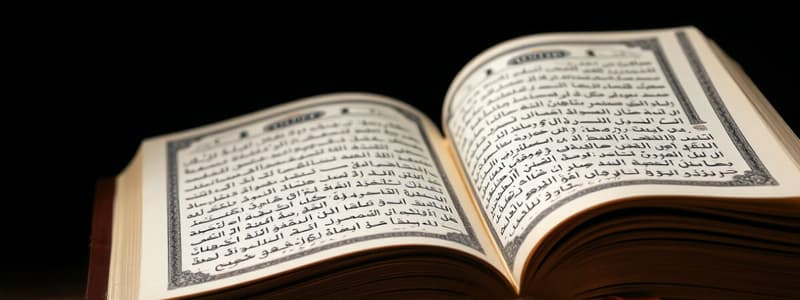Podcast
Questions and Answers
Which book is specifically mentioned as being given to Dawood?
Which book is specifically mentioned as being given to Dawood?
- The Scriptures of Ibraheem
- The Tawraah
- The Zaboor (correct)
- The Injeel
What element of belief is highlighted as a pillar of Eeman?
What element of belief is highlighted as a pillar of Eeman?
- Belief in Allah's Books (correct)
- Belief in the Last Day
- Belief in Allah's Angels
- Belief in Allah's Messengers
Which phrase reflects the consequence of disbelieving in Allah's Books?
Which phrase reflects the consequence of disbelieving in Allah's Books?
- He has strayed far away. (correct)
- He will be rewarded in the Hereafter.
- He will find guidance.
- He will be granted knowledge.
What does belief in the books entail according to the content?
What does belief in the books entail according to the content?
What warning is given regarding those who reject the Messenger?
What warning is given regarding those who reject the Messenger?
What was the primary role of the angel Jibreel during the revelation of the Quran?
What was the primary role of the angel Jibreel during the revelation of the Quran?
Which criteria was NOT required for a verse to be included in the compilation of the Quran during Abu Bakr's khilafah?
Which criteria was NOT required for a verse to be included in the compilation of the Quran during Abu Bakr's khilafah?
Why was the decision made to keep only one dialect of the Quran for recording?
Why was the decision made to keep only one dialect of the Quran for recording?
What is one characteristic of the Quran mentioned in the content?
What is one characteristic of the Quran mentioned in the content?
During whose leadership was the Quran compiled into a specific order?
During whose leadership was the Quran compiled into a specific order?
Study Notes
Belief in Allah's Books
- Belief in Allah’s Books is a fundamental pillar of Eeman, essential for being a true believer.
- Believers must accept previously revealed scriptures, including:
- Scriptures of Ibraheem and Moosa, referenced in Quran 87:18-19.
- The Zaboor, granted to Dawood (David), mentioned in Quran 17:55.
- The Tawraah (Torah), sent to Moosa (Moses) containing guidance and light per Quran 5:44.
- The Injeel (Gospel), revealed to 'Eesa (Jesus) as noted in Quran 57:27.
- Other scriptures exist, though not all are named or counted.
- Previous messengers, despite their miracles and proofs, were sometimes rejected, as noted in Quran 2:255.
- The Quran was revealed over 23 years, initially organized into chapters during the Prophet’s (PBUH) lifetime.
Compilation of the Quran
- The Quran was not compiled into a single book during the Prophet's (PBUH) life; instead, chapters and verses were organized with guidance from the angel Jibreel.
- After the Prophet's death, the Quran was collected during Abu Bakr's caliphate, ensuring a standardized order due to varying arrangements among companions.
- Zayd ibn Thabit (RA) was appointed to lead the compilation process with strict conditions:
- Verses had to be widely memorized by companions.
- Must exist in written form.
- Each verse needed confirmation from at least two witnesses who heard it directly from the Prophet (PBUH).
Linguistic Elements of the Quran
- The Quran was revealed in pure Arabic and in seven dialects to facilitate understanding among Arabs.
- Only the dialect of the Quraish was officially preserved for non-Arab followers to avoid confusion.
- Certain words in the Quran are not purely Arabic, including names (e.g., Ibraheem) and foreign terms.
Significance of the Quran
- The Quran is referred to by multiple names and has various descriptions in sacred texts.
- It serves as guidance, mercy, and healing for believers, addressing the diseases of ignorance and doubt.
Belief in the Messengers
- Belief encompasses all messengers of Allah, regardless of whether they are named or not.
- Quranic verses emphasize the humanity of messengers, as seen in Quran 3:144 and 25:20, acknowledging they ate and lived among people.
- No messengers were sent from the jinn to humans, and the Prophet (PBUH) was tasked with conveying the message to both human and jinn audiences.
Messenger Selection and Miracles
- Allah specifically chose prophets (Mustafawn), signifying that prophethood cannot be attained solely through effort as stipulated in Quran 38:47.
- Prophets were granted miracles (Mu'jizah) to support their messages, though proof alone does not guarantee belief.
- Notable miracles include:
- Ibraheem (AWS) surviving a fire without injury.
- Hud (AWS) challenging his people without harm.
Purpose of Revelation
- Revelation serves to guide humanity, restore justice, and prevent corruption, supported by the statement in Quran 57:25.
- It aims to correct rights and relationships among people, guiding them towards righteousness and mercy.
Reactions of Believers
- In paradise, believers express gratitude for guidance received through messengers and scriptures, highlighting the divine help in finding truth.
Studying That Suits You
Use AI to generate personalized quizzes and flashcards to suit your learning preferences.
Related Documents
Description
Explore the significance of belief in Allah's Books as a fundamental pillar of Eeman in this quiz. Delve into the teachings that highlight the importance of trusting in Allah's revelations through scripture. This chapter emphasizes the connection between faith and obedience to divine messages.




